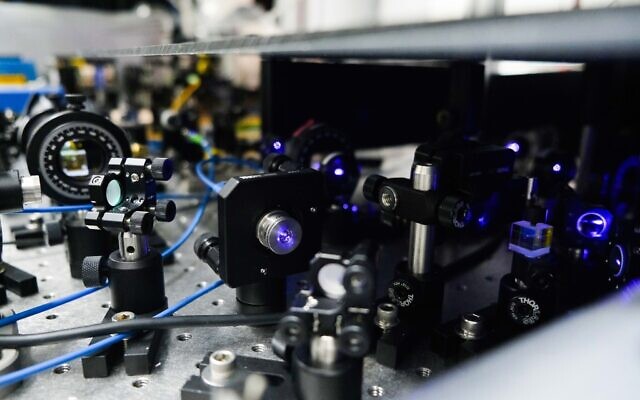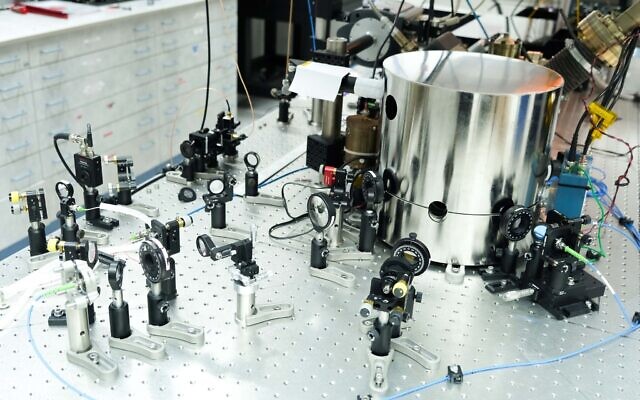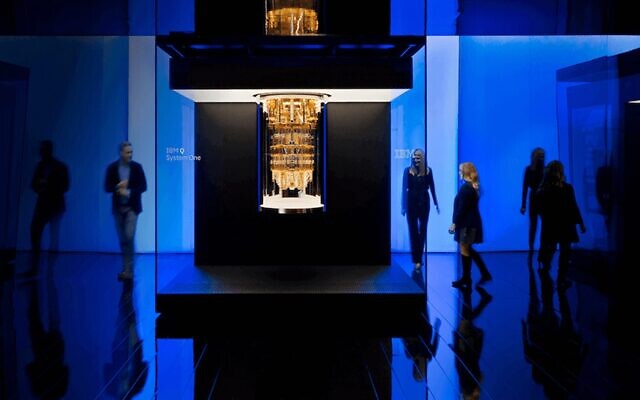
Team at Weizmann Institute unveils five-qubit machine,
one of only about 30 such devices in the world.
An Israeli team of researchers has built the country’s first quantum computer, a major feat that has been years in the making, according to Prof. Roee Ozeri of the Weizmann Institute of Science, an expert in quantum computing research in the Department of Physics of Complex Systems.
Ozeri told The Times of Israel in a phone interview Tuesday that he and a team of PhD students at his university lab have been working on the different elements of the computer for several years and have spent the past two to three years assembling the device.
“There was a lot of time invested in the know-how and in putting together the building blocks for the quantum computer,” he said.
The project was led by Dr. Tom Manovitz, a quantum computing researcher, and research student Yotam Shapira, and was published Tuesday in PRX Quantum, a peer-reviewed journal published by the American Physical Society (APS).

The field is relatively new and extremely complex, but experts say that quantum computing can be extremely beneficial in industries like cybersecurity, materials and pharmaceuticals, banking and finance, and advanced manufacturing, and may lead to massive developments in broad fields like economics, security, engineering, and science.
Tech giants like Google, Microsoft, IBM, and Intel are all racing to make quantum computing more accessible and build additional systems, while countries such as China, the US, Germany, India, and Japan are pouring millions into developing their own quantum abilities.
According to recent market projections, the global quantum computing market size is expected to have been worth $487.4 million in 2021 and reach $3.7 billion by 2030.
The Weizmann computer is a five-qubit machine, roughly the level achieved by IBM’s version when the company first started offering quantum computing as a cloud service last year.
Ozeri said the team will now use the quantum computer to run advanced algorithms while working on a larger machine that will tackle larger data loads. He estimated that the larger quantum computer, dubbed WeizQC, will take at least another year.
The name WeizQC is a tribute to WEIZAC, the name of one of the world’s first computers built in Israel at the Weizmann Institute in the 1950s, “when all Israel had was swamps and camels,” Ozeri said as part of a university statement.

“Today Israel is a technological empire; there’s no reason we shouldn’t be front-runners in the quantum computing race,” he said.
WeizQC is expected to work with 64 qubits and “demonstrate the quantum advantage, which until now has only been achieved by computers built in two labs: at Google, and
at the University of Science and Technology of China,” the university noted.
Quantum computers are expected to address “various [data] problems that cannot be solved today; it’s a new computing paradigm where we take problems that are — today — unsolvable, and tackle those,” said Ozeri. As examples, he cited “things like traffic data, new molecules and drugs, [and] cryptography.”

But Ozeri also acknowledged that the practical uses for quantum computers were still “an open question.”
“We are still finding out the true potential,” he said.
Quantum advances
Israel is home to about two dozen startups and companies currently focused on quantum technologies, including Quantum Machines, which raised $50 million last September. The company was founded in 2018 and went on to develop a standard universal language for quantum computers, as well as a unique platform that helps them run.
Last month, the Israeli Innovation Authority and the Defense Ministry said they will spend approximately NIS 200 million ($62 million) to develop a state quantum computer and lay the foundation for Israeli computational ability in the field.
The budget will fund two parallel avenues, according to the announcement. The Israel Innovation Authority will focus on developing the infrastructure for quantum computational ability which, it said, may include the use of technology from abroad.
The Defense Ministry’s Directorate of Defense Research and Development (DDR&D), meanwhile, will establish a national center with quantum capabilities that will work with academia, industry, and government partners to develop a quantum processor and then a complete quantum computer.
The initiative is part of the 2018 launch of Israel’s National Quantum Science and Technology Program with a budget of NIS 200 million, later expanded to NIS 1.25 billion ($390 million). The program was initiated to facilitate relevant quantum research, develop human capital in the field, encourage industrial projects, and invite international cooperation on research and development.
(Times of Israel).